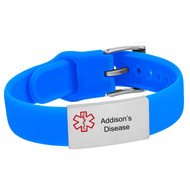Should Someone with Addison's Disease wear a Medical ID?
Posted by Lori Torman on 1st Oct 2025
Yes, it is highly recommended that someone with Addison's disease wear a medical ID at all times
This practice is considered a vital safety measure that can provide life-saving information to emergency responders and medical professionals, especially during an adrenal crisis when the individual may be unconscious or unable to communicate.
Why a medical ID is critical for Addison's disease
- Warns of adrenal crisis: Stressful events like infection, injury, or surgery can trigger an adrenal crisis, a medical emergency caused by dangerously low cortisol. An adrenal crisis can lead to shock, coma, and death if not treated immediately with a stress dose of corticosteroids.
- Directs immediate treatment: The medical ID alerts first responders to the need for prompt administration of an emergency corticosteroid injection, such as hydrocortisone. This critical information helps them bypass potential delays and provide the correct treatment quickly.
- Prevents treatment complications: Medical professionals who are unaware of a patient's adrenal insufficiency might provide inappropriate or contraindicated medications. A medical ID ensures they understand the patient's steroid dependency.
- Informs providers who may be unfamiliar with the condition: Addison's disease is rare, so some doctors and emergency responders may not be familiar with it or its specific emergency protocols. The medical ID provides crucial, internationally recognized information.
What to engrave on the medical ID
Based on advice from medical experts and advocacy groups, you should engrave the following information:
- Your name
- Your diagnosis: State "Addison's Disease" or "Adrenal Insufficiency". It is also helpful to add "Steroid Dependent" or "Risk of Adrenal Crisis".
- Your treatment needs: If you carry an emergency injection, include "Hydrocortisone Injection" or "Emergency Injection Kit On Person".
- Key medications: List other life-sustaining medications you take.
- Allergies: List any allergies to medications or foods.
- Emergency contact: Include an in-case-of-emergency (ICE) phone number.
Complementary forms of medical identification
In addition to a bracelet or necklace, consider these additional layers of safety:
- Medical ID card: Carry a wallet-sized card with more detailed information, such as your doctor's name and contact information, a list of all your medications, and extra emergency contacts.
- Wearable and luggage tags: For those who carry an emergency injection kit, tags can help others locate the medication
StickyJ Medical ID has a wide variety of affordable medical jewelry that can be custom engraved based on your specific needs.
This article is for informational purposes only. Always consult a medical professional for a diagnosis and what to engrave on your medical id.


